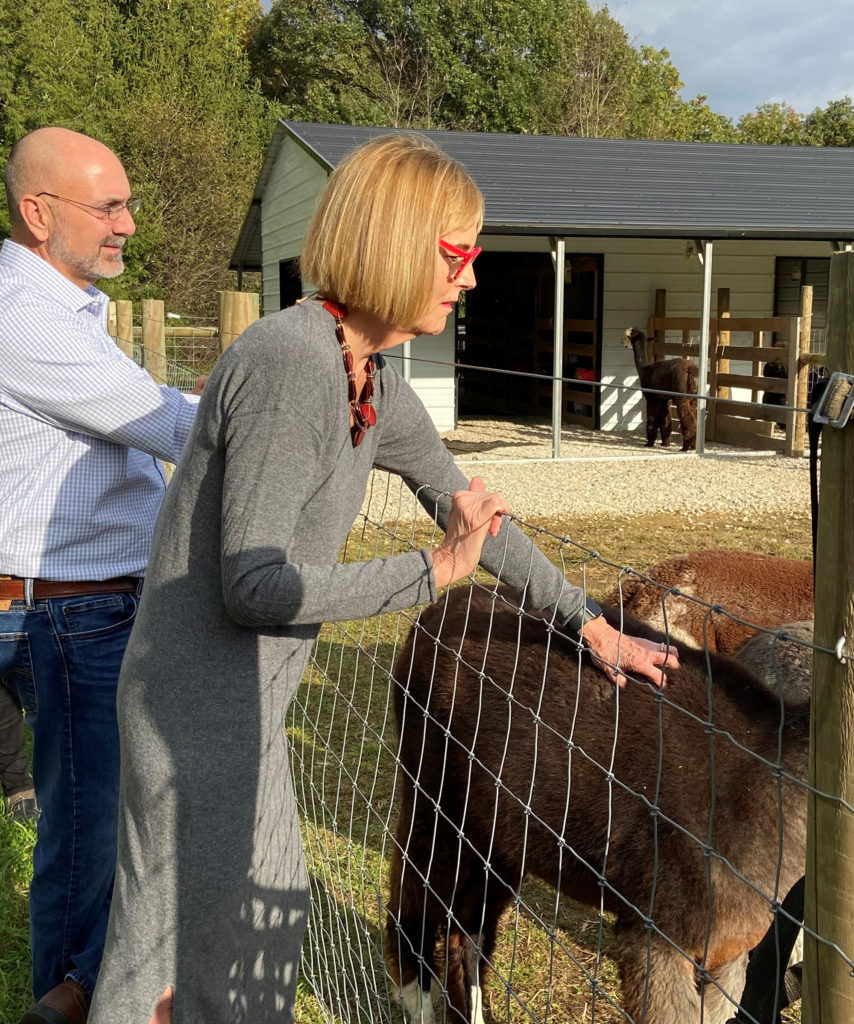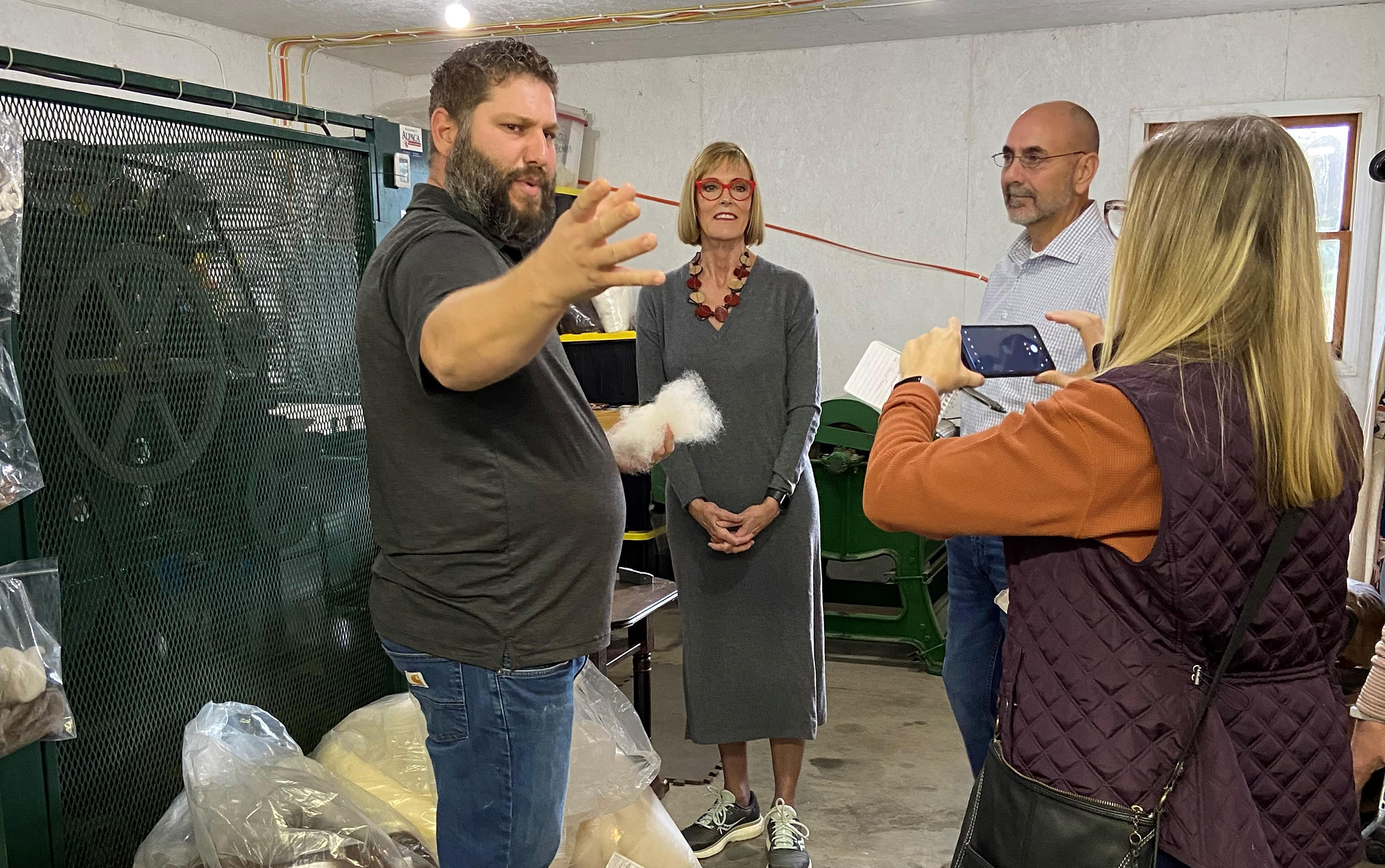By Miles Flynn | Southern Indiana Business Report
TASWELL — What began not that long ago as a couple’s desire for a life in the country and a hobby farm has quickly evolved into a multi-faceted business that’s turning out one-of-a-kind products and bringing thousands of agritourism visitors to Crawford County. Lt. Gov. Suzanne Crouch and State Rep. Stephen Bartels got a look at Red Hill Fiber Mill and Alpaca Farm themselves during an Oct. 29 tour led by owners Ty and Lindsey Higgins.

A long, winding road to Crawford County
Las Vegas, Nevada, may seem like an unlikely starting point for a journey that would ultimately end in rural Crawford County, but that’s exactly where things began for the couple. Lindsey explained she’s from the City that Never Sleeps and Ty had moved there for a job after serving in the Navy. Their desire to move to Indiana sprang from a visit to the area. “I fell in love with the greenery and the seasons,” Lindsey told Southern Indiana Business Report.
The couple settled in Louisville, Kentucky, first but didn’t enjoy the city life. They relocated across the river to Jeffersonville and then a little farther off the beaten path in Greenville. When they learned about land for sale in Taswell, just southeast of Patoka Lake and surrounded by the Hoosier National Forest, they pulled up stakes one more time in 2016.
A big reason the country life appealed to them was it offered a chance to keep a garden and small farm to provide basic necessities for their family. Ty said it was the kind of life his grandparents always had. “They didn’t buy, really, anything at the grocery,” he related. “… That’s kind of what I wanted for my kids.”
The farm also quickly became a home to the alpacas Lindsey wanted as pets and to provide wool for yarn for her crafting projects. “The first four or five pets came pretty quick,” Ty said.
Those first animals marked the beginning of quite a learning experience for the couple.
Business relies on couple’s unique skillset
With half a dozen animals, Ty and Lindsey had too much raw material to spin by hand themselves. The idea of making a business got its start when they tried to find someone to process their wool. They found there’s such a universal backlog in orders that, after sending off their wool and paying a deposit, they’d have to wait 12-18 months to get their yarn. They saw an opportunity — one that perfectly matched Ty’s background in mechanical engineering and manufacturing and Lindsey’s extensive business experience.
Early on, working with the Indiana Small Business Development Center was extremely helpful. The couple encourages anyone who’s seeking information and assistance getting into a business mindset to check out the agency. The effort also worked closely with Purdue Extension, the United States Department of Agriculture, Crawford County Economic Development, and Indiana Grown. “The Indiana Grown folks have been very great to work with,” Lindsey said.
A major boost came when the couple had a rare chance to purchase used mill machinery. It was being sold by Pam Pullens, retiring operator of Sweet Home ALApaca in Blountsville, Alabama. Since Pullens wanted to find someone who would truly continue the legacy she’d built, she required interviews with potential buyers. Ty and Lindsey were thrilled to be chosen, and they said Pam has remained available right through today to answer calls whenever they have questions. They’re still hoping to get her up to Red Hill to see the operation. “We wouldn’t be successful without her,” Ty said.
Now, as one of only approximately 28 mills nationally and two in Indiana that specialize in handling alpaca wool and blending it with other materials, Red Hill has its own 12-month backlog of processing jobs, with customers calling from as far away as Connecticut, Washington and Texas. “Our waitlist is like 18 people long right now,” Lindsey said.
Ty explained the dearth of mills focusing on alpaca is attributable in large part to how much more challenging it is to handle than sheep wool. “Every alpaca fleece is different,” he said. “There’s nothing uniform about it.”
The rapid growth coincided with Ty being furloughed from his day job. Circumstances ultimately allowed him to quit and devote all of his time to the business starting in early 2020. Lindsey was able to leave her job and follow him this February. Ty said family members have gone from thinking he and his wife were crazy to cheering them on.
Growth into retail and agritourism
From the start, Red Hill’s business model has been dynamic. Ty described it as “grabbing” at as many revenue streams as possible by “throwing spaghetti at the wall” to see what sticks. “Being a modern farmer, you have to be flexible,” he said.
A storefront was added at the farm to market the one-of-a-kind creations crafted by Lindsey, and it also has an online presence now. However, the couple explained, the one-off nature of each item means it’s hard to keep the listings of offerings up to date.
Another early outgrowth was agritourism. While the COVID shutdown kept everyone indoors at first, and allowed the couple to focus on getting their processing operation up to speed, the growing desire of people to get out and explore soon followed.
The Alpaca Owners Association has long encouraged its members to offer chances for the public to engage with alpaca farms and businesses. So, Ty and Lindsey rolled out a fall event in 2020 to introduce the public to Red Hill. Then, inspired by their own experience homeschooling their sons, Paxton and Liam, they initiated a homeschool day to bring in other students and teach them about the animals and the fiber business.
Soon, a steady stream of visitors was trickling into the farm. The outings became so constant that the couple decided it was time to institute some order. An appointment process was introduced, and Red Hill began charging $10 a head for tours of the operation, with children younger than 5 admitted for free.
Enrollment with the camping services Harvest Hosts and Hip Camp followed for primitive camping at the farm. While the services are viewed largely as traffic generators for the farm and its store, Hip Camp also provides Red Hill with a tidy sum through its fees.
For 2021, through camping, school groups and other tours, the business is on track to welcome approximately 5,000-6,000 people. “We draw a lot from the Evansville area,” Lindsey said.
Expansion in the near term
Red Hill is poised for immediate growth in several directions. A larger storefront and manufacturing area are in the process of being added at the mill now. A classroom is also in the works, which would host more visiting students plus the spinners and weavers guild or other educational groups.
To expand on their agritourism offerings, Ty and Lindsey also hope to add at least two Airbnb rental cabins. And to give those visitors more to do, they’re looking to develop “alpaca treks.” Participants would be able to lead haltered animals on walks through the woods. Another idea is the formation of an artisan market to give Southern Indiana’s many talented woodworkers, glassblowers and other craftspeople a venue to sell their creations.
Ty and Lindsey are also eager to continue partnering with their new home county and with the many other attractions around the area. And one way they’re getting involved already is working with Purdue Extension to host an alpaca club. Paxton will be old enough to show alpacas through the local 4-H soon. “We’re very focused on making a better Crawford County,” Ty said.
An evolving business model
Somehow, Ty and Lindsey have also found time for long-term planning. And in the next five to 10 years, Red Hill’s operations could look very different from today.
Right now, contract processing for customers accounts for about 50% of Red Mill’s total revenue. Contributing about 45% is an even mix of tours, camping and special events. And the last 5% is chipped in by animal sales from breeding operations. That’s not the mix the couple envisions for the long haul, though.
While contract processing is providing a steady flow of safe money now, Ty and Lindsey plan to ratchet down that segment to focus on the greater profitability available through producing their own yarn. Using more of their processing capacity for their own wool would mean much better returns.
Keeping a single alpaca costs approximately 13.5 cents per day, which comes out to less than $800 annually for the current herd of 16 alpacas. “They’re very sustainable,” Ty said.
Each animal produces a fleece of about eight to 12 pounds, with the “prime blanket” — the finest fleece — being three to six pounds. Right now, with 16 animals, Red Hill gets about 80 pounds of usable wool a year, which equates to approximately 400 skeins of yarn at a market price of about $10,500, or a little more than $131 per pound of wool, compared to the $35 per pound the couple gets for processing other people’s raw material. (The fleece that isn’t fit for yarn is used for applications such as industrial insulation and dryer balls. “We do something with every bit of it.” Ty noted.)
Meanwhile, selling Red Mill’s own products — with value added in house at every step, from raising the animals through final manufacturing — would mean $200-$300 per pound of wool.
That premium comes from the fact that all-local production is such an attractive alternative to most other textiles, which are completely untraceable and benefit hardly anyone in the United States. Here, Ty said, customers can meet the animals and know a purchase touches local people, from the producer and manufacturer right down through local feed dealers. “People don’t mind paying that premium when they understand all the things and get to see that,” Ty said.
Ty and Lindsey have been invited to share the message of how to add value and increase margins at a panel discussion during the Indiana Small Farm Conference March 3 and 4, 2022, in Danville.
To keep up with the demand for goods, though, Red Hill will need to add high-speed knitting machines, more milling capacity and, of course, more animals. The couple’s hope is to add enough land to allow for a herd of 200-300 alpacas.
Now is the time to plan, too, since growing a herd is a slow process. And in the case of alpacas, Lindsey explained, “It takes a long time.” She noted the animals have a gestation period of 345-450 days.
In addition, Red Hill is on the hunt for good people. Ty and Lindsey would like to add an employee with experience and passion to become mill manager. Then two to three more employees would allow for the kind of capacity needed.
If the plan results in the sort of success the couple believes it will, then a next step could be adding even more milling capacity to handle contract work without impacting production of Red Mill’s own goods.
By that time, the next generation of the Higgins family may be ready to take a hand in operations themselves. Paxton, who’s now 7, shows a creative flair and is quite interested in the operation of the store. And 2-year-old Liam is already showing an affinity for working with the animals. His daily practice is to put on his boots and run out to be with the alpacas. “We joke that he’s our farm manager,” Lindsey said.



